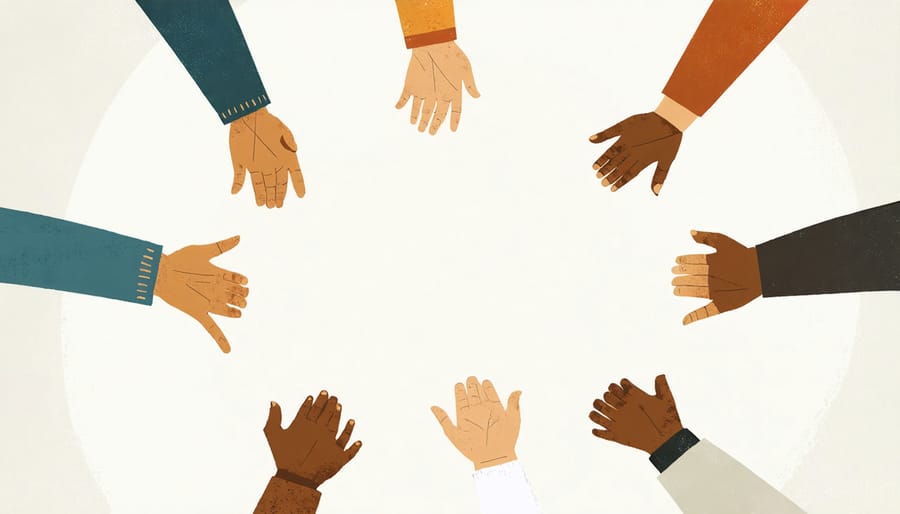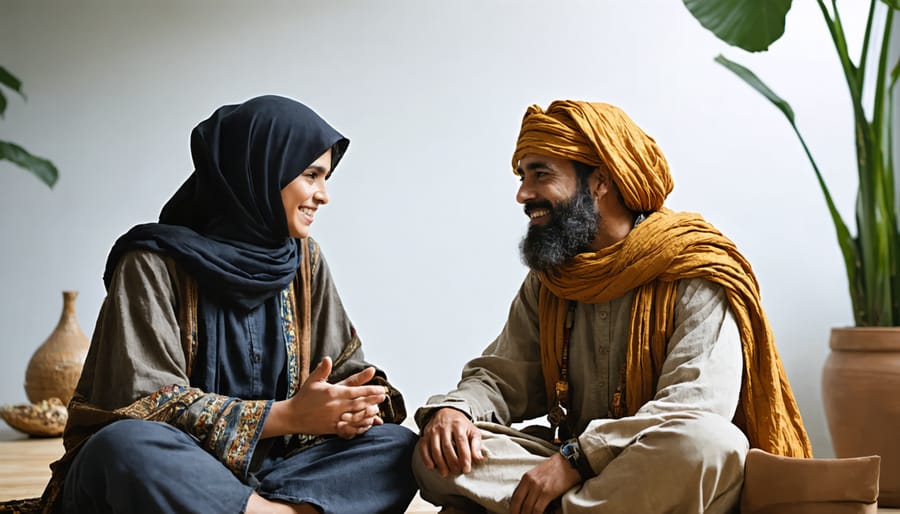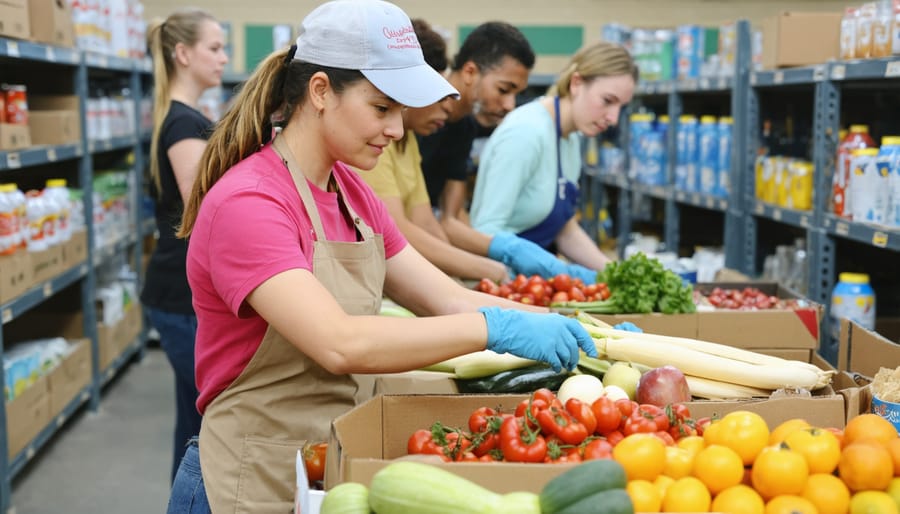In a world torn by religious strife, interfaith cooperation offers a beacon of hope. When people of different faiths come together in a spirit of respect, understanding, and shared purpose, walls crumble and hearts open. Interfaith initiatives do more than promote tolerance – they celebrate the rich diversity of the human spirit while affirming our common humanity.
Through honest dialogue, collaborative service, and joyful community, interfaith cooperation reveals that what unites us is far greater than what divides. It challenges us to transcend labels, shatter stereotypes, and embrace one another as fellow children of God. In a society polarized by religious differences, the courageous work of interfaith bridge-builders lights the way to a more just, peaceful, and compassionate world.
For people of faith, interfaith engagement is both a spiritual imperative and a practical necessity in the 21st century. It invites us to live out the Golden Rule that is the ethical cornerstone of all religious traditions. In a radically interconnected world, cultivating interfaith understanding has become an essential tool for addressing shared challenges and an indispensable ingredient for the common good.

Understanding Our Shared Values
The Golden Rule
The Golden Rule, a principle that encourages treating others as you wish to be treated, is a shared value across many faiths. In Christianity, Jesus teaches, “Do to others as you would have them do to you” (Luke 6:31). Similarly, Islam’s Prophet Muhammad said, “None of you truly believes until he loves for his brother what he loves for himself.” Hinduism’s Mahabharata declares, “One should never do that to another which one regards as injurious to one’s own self,” while Buddhism’s Udanavarga states, “Hurt not others in ways that you yourself would find hurtful.” Judaism’s Torah commands, “Love your neighbor as yourself” (Leviticus 19:18). These examples reveal a common thread of empathy and compassion woven through diverse spiritual traditions. By recognizing this shared ethic, we can find common ground and build bridges of understanding between faiths, embodying the very essence of the Golden Rule itself.
Respect for Human Dignity
All major faith traditions share a core belief in the inherent dignity and worth of every human being. Christianity teaches that all people are created in the image of God (Genesis 1:27), while Islam emphasizes the equality of all before Allah. Hinduism and Buddhism recognize the divine spark within each person, and Judaism stresses the sanctity of human life. These beliefs call us to treat others with kindness, compassion, and respect, regardless of their religious background. By honoring the dignity of all people, we fulfill the Golden Rule found in many spiritual traditions: to treat others as we wish to be treated ourselves. Interfaith cooperation allows us to put this principle into practice by building relationships based on mutual understanding and respect. When we approach others with an open heart and a willingness to learn, we discover our shared humanity and the beauty of our diverse faith expressions.
Learning Through Dialogue

Listening with an Open Heart
When engaging in interfaith dialogue, one of the most important skills to cultivate is active listening. This means approaching conversations with an open heart, setting aside preconceived notions or judgments, and truly seeking to understand the experiences and perspectives of others. As Christians, we are called to love our neighbors as ourselves (Mark 12:31), and this includes those whose beliefs may differ from our own. By listening with empathy and respect, we create a safe space for authentic sharing and mutual understanding. We demonstrate that we value the inherent dignity of every person, recognizing that each individual is created in the image of God (Genesis 1:27). Through open-hearted listening, we build bridges of trust and compassion, laying the foundation for meaningful interfaith cooperation.
Asking Questions Respectfully
When asking others about their religious beliefs, approach with a spirit of genuine curiosity and respect. Begin by expressing your interest in learning more about their faith tradition, emphasizing your desire to understand rather than debate. Ask open-ended questions that allow for personal reflection, such as “What aspects of your faith bring you the most meaning and purpose?” or “How does your religious background shape your daily life?” Listen attentively to their responses, avoiding interruptions or judgmental reactions. If you encounter unfamiliar terms or practices, politely ask for clarification. Remember that interfaith dialogue is an opportunity to build bridges, not to prove a point. By showing sincere respect and a willingness to learn, you create a safe space for mutual understanding and appreciation of each other’s beliefs.
Serving Together in Community

Interfaith Food Drives
Faith communities can demonstrate the power of interfaith cooperation by organizing joint food drives to support those facing hunger and food insecurity in their local area. By pooling resources, volunteers, and expertise, churches, synagogues, mosques, and temples can maximize their impact and reach more people in need. Interfaith food drives offer a tangible way to put shared values of compassion, generosity, and service into action.
To organize an interfaith food drive, start by reaching out to faith leaders from different traditions to gauge interest and build a planning team. Together, identify a local food bank or pantry to support and set a goal for the number of meals or pounds of food you hope to collect. Promote the food drive within each participating faith community, emphasizing the importance of coming together across religious boundaries to serve others, as Jesus taught in the parable of the Good Samaritan (Luke 10:25-37).
Coordinate logistics such as drop-off locations, volunteer schedules, and transportation of donated items. Consider friendly competitions between faith groups to encourage participation. Most importantly, take time to build relationships and understanding among volunteers from diverse backgrounds as you work side-by-side to combat hunger. By uniting in service, we embody God’s call to love our neighbors and care for “the least of these” (Matthew 25:40).
Joint Environmental Efforts
As people of faith, we are called to be responsible stewards of the earth. One powerful way to live out this calling is by joining hands with those of different religious traditions in eco-friendly initiatives that protect and preserve God’s creation. Interfaith environmental projects not only make a positive impact on our shared planet but also foster mutual understanding and respect among diverse faith communities.
From community gardens to river clean-ups, there are countless opportunities for Christians to collaborate with their neighbors in caring for creation. Planting trees together, organizing recycling drives, or advocating for sustainable policies are just a few examples of how we can unite across religious boundaries to address pressing ecological challenges. By working side by side, we demonstrate that our common love for the earth transcends any differences in belief or practice.
As we engage in these joint efforts, let us approach one another with open hearts and minds, eager to learn from the unique perspectives and wisdom each faith tradition brings to environmental stewardship. Together, we can bear witness to the truth that caring for the earth is a sacred duty entrusted to all humanity by our Creator.
Celebrating Shared Holidays and Festivals
As Christians, we can enrich our own faith and foster greater understanding by acknowledging and appreciating the holidays and festivals of other religions. Consider attending a Passover Seder hosted by Jewish friends or colleagues, where you can learn about the rich symbolism and history behind this sacred meal. During Ramadan, you might offer words of support and encouragement to Muslim neighbors who are fasting, or even participate in an interfaith iftar to break the fast together. Diwali, the Hindu festival of lights, presents an opportunity to share in the joy and beauty of this celebration, perhaps by lighting candles or exchanging small gifts with Hindu acquaintances.
By engaging in these experiences with an open heart and mind, we can deepen our appreciation for the diverse ways in which people express their faith and devotion. As we learn about the traditions and values of other religions, we may even discover parallels and common ground with our own Christian beliefs. Ultimately, by celebrating shared holidays and festivals, we embody the love, compassion, and unity that lie at the core of our faith, building bridges of understanding and cooperation across religious boundaries. In doing so, we bear witness to the inclusive and transformative power of God’s love for all people.
Supporting Religious Freedom for All
As Christians, we are called to love our neighbors and stand up for justice. This includes defending the right of all people to practice their faith freely, without fear of persecution or discrimination. The Bible teaches that God created humanity in His image (Genesis 1:27), endowing each person with inherent dignity and worth. Throughout history, Christians have played a vital role in promoting religious freedom for all.
In the early church, Christians faced intense persecution from the Roman Empire. Yet they bravely continued to gather for worship and proclaim their faith. Later, reformers like Martin Luther and William Penn advocated for freedom of conscience and the right of all people to follow their religious convictions without state interference.
Today, as Christians, we must continue this legacy by standing in solidarity with people of all faiths facing religious oppression. When we speak out against the persecution of Muslims, Hindus, Sikhs, Jews, and others, we reflect Christ’s love and counter the narrative that Christianity seeks dominance over other religions.
Supporting religious freedom for all doesn’t mean compromising our own beliefs. Rather, it demonstrates our trust that the Holy Spirit can work in people’s hearts and our confidence in the power of the Gospel. By upholding the dignity of every person and their right to make choices about their faith, we create a society where the message of Jesus can be freely shared and received. As we extend to others the religious liberty we desire for ourselves, we live out the Golden Rule and provide a witness to God’s love for all people.
Conclusion
As Christians, we are called to be peacemakers and bridge-builders in a world often divided by religious differences. By embracing interfaith cooperation, we demonstrate the love, compassion, and respect that are at the heart of our faith. Through genuine dialogue, humble service, and joyful celebration with people of other faiths, we not only deepen our own spiritual understanding but also contribute to a more harmonious and just society. Let us take these principles to heart and put them into practice in our daily lives and communities. In doing so, we become living examples of Christ’s message of love and unity, shining a light of hope in a world that desperately needs it.
